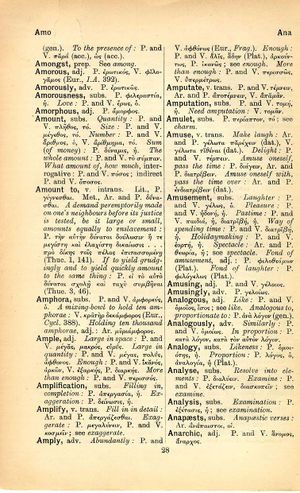amount to: Difference between revisions
From LSJ
Βουλῆς γὰρ ὀρθῆς οὐδὲν ἀσφαλέστερον → Nam tutior res nulla consilio bono → Denn nichts führt weniger irre als ein guter Rat
(Woodhouse 2) |
(CSV3) |
||
| Line 1: | Line 1: | ||
{{ | {{Woodhouse1 | ||
| | |Text=[[File:woodhouse_28.jpg|thumb|link={{filepath:woodhouse_28.jpg}}]]'''v. intrans.''' | ||
<b class="b2">Lit.</b>, P. [[γίγνομαι|γίγνεσθαι]]. Met., Ar. and P. [[δύναμαι|δύνασθαι]]. | |||
<b class="b2">A demand peremptorily made on one's neighbours before its justice is tested, be it large or small, amounts equally to enslavement</b>: P. τὴν αὐτὴν δύναται δούλωσιν ἥ τε μεγίστη καὶ ἐλαχίστη [[δικαίωσις]] . . . πρὸ δίκης τοῖς [[πέλας]] ἐπιτασσομένη (Thuc. 1, 141). | |||
<b class="b2">If to yield grudgingly and to yield quickly amount to the same thing</b>: P. εἰ τὸ αὐτὸ δύναται σχολῇ καὶ ταχὺ συμβῆναι (Thuc. 3, 46). | |||
}} | }} | ||
Revision as of 09:19, 21 July 2017
English > Greek (Woodhouse)
v. intrans.
Lit., P. γίγνεσθαι. Met., Ar. and P. δύνασθαι.
A demand peremptorily made on one's neighbours before its justice is tested, be it large or small, amounts equally to enslavement: P. τὴν αὐτὴν δύναται δούλωσιν ἥ τε μεγίστη καὶ ἐλαχίστη δικαίωσις . . . πρὸ δίκης τοῖς πέλας ἐπιτασσομένη (Thuc. 1, 141).
If to yield grudgingly and to yield quickly amount to the same thing: P. εἰ τὸ αὐτὸ δύναται σχολῇ καὶ ταχὺ συμβῆναι (Thuc. 3, 46).

